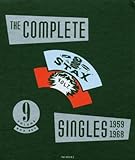That there wasn’t one already seems unfathomable. Now that the Memphis Music Hall of Fame has been created, however, its inaugural class can assembled with a snap resembling the legendary hometown Stax Records logo.
Al Green, B.B. King, Elvis Presley, Jerry Lee Lewis, Isaac Hayes, Otis Redding, the Staple Singers, the founders Stax and Sun Records, Booker T. and the MGs, Howlin’ Wolf and Bobby “Blue” Bland are just a few of the legends that immediately come to mind — and each will be so honored.
The new hall of fame, to be housed in the Smithsonian’s Memphis Rock N Soul Museum on Beale Street, announced 25 initial inductees in all. A complete list, along with our thoughts on a few of the artists, can be found below.
Inductees were selected via a nominating committee that included Al Bell, Nelson George, Robert Gordon, Peter Guralnick and other notable musicians, industry professionals and historians. The first induction ceremonies are set for Thursday, November 29, 2012, at the city’s Cannon Center for the Performing Arts.
The complete list of honorees: Al Green, B.B. King, Bobby “Blue” Bland, Booker T. and The MG’s, Elvis Presley, Howlin’ Wolf, Isaac Hayes, Jerry Lee Lewis, Otis Redding, Rufus Thomas, Sam Phillips, the Staple Singers, W.C. Handy and ZZ Top. Also to be honored are Stax Records founders Estelle Axton and Jim Stewart, Lucie Campbell, George Coleman, Jim Dickinson, Jimmie Lunceford, Professor W.T. McDaniel, Memphis Minnie, Willie Mitchell, Dewey Phillips, Three 6 Mafia and Nat D. Williams. For more, go to vvnmusic.com.
Here’s a look back at our recent thoughts on several of the inductees. Click through the titles for complete reviews …
ONE TRACK MIND: AL GREEN, “TIRED OF BEING ALONE” (1971): You made out to Al Green. It’s what worked. Only later, did you realize all that had gone on in those records, starting with this — Green’s first charting hit, “Tired of Being Alone.” His is a voice that whips around, like a sparrow, from flat-footed baritone — all silky-smooth grace and twinkling smile — to burning, yearning falsetto. He was Motown plus Stax, both smooth and gritty. More particularly, Al Green worked within the rhythm like a refined jazz singer, even if he appeared in all of the outsized 1970s soul-man accoutrements of the day. His way of bending and shaping a line, of slowing down and then inching forward across the tempo spoke to a broader talent. That makes Al Green’s genius, for me, the more modern equal of Sinatra’s and Cole’s.
BACKSTAGE WITH B.B.: KING OF THE BLUES IS GENEROUS BOTH ON AND OFFSTAGE: B.B. King, inside the bright circle of television light, asks someone to bring him a soda. The stage crew, meanwhile, is hurriedly disassembling the stage out in the arena. King takes a sip and looks at the label: “We’re not getting paid for his,” he says, and puts the can out of sight. He has been signing an endless stream of albums, pictures and scraps of paper, first just off stage and then in his dressing room. King’s been interviewed, photographed and given the key to the city. The concert has been over for hours, forever. But B.B. King is just getting started.
BOOKER T. AND THE MGs’ STEVE CROPPER ON ‘SOUL MAN,’ ‘DOCK OF THE BAY,’ ‘KNOCK ON WOOD,’ OTHERS: Steve Cropper, of Booker T. and the MGs and Stax Records fame, has trouble picking any one moment on his upcoming star-studded project Dedicated as his favorite. So, we went further back into his legendary soul-soaked career. “I can tell you it was a lot of fun,” Cropper says of his new 429 Records release, due in August. “To be there in the studio, and watch B.B. King sitting on the coach with a microphone on a short stand, singing on your record. That’s about as good as it gets. But everybody put in 200 percent. It would be so difficult to pick a favorite moment. Impossible.” Instead, we’ll delve into Cropper’s mythical past in Memphis, as he appeared on genre-establishing sides as a sideman and producer with Sam and Dave, Eddie Floyd, the Mar-Keys and Otis Redding, among many others.
HOWLIN’ WOLF – THE LONDON HOWLIN’ WOLF SESSIONS (1971): It was payback time for ’60s-stars Eric Clapton, Steve Winwood, Ringo Starr, and the rhythm section from the Rolling Stones. After all, vocalist and harmonica player Chester Arthur Burnett — you might know him better as Howlin’ Wolf – had been one of the chief architects, at least in spirit, for the decade of sound and fury that served as the crucible for their careers. It’s perhaps no surprise, then, that a series of collaborative sessions in May of 1970 were loose and laid back. Each of these rock superstars plays it reserved and respectful, while Burnett gamely howls, and growns and spits. And that’s just his harp work on “Worried About My Baby” and “Who’s Been Talking.”
ISAAC HAYES (1942-2008): AN APPRECIATION: He was a renaissance man in gold chains, a composer and arranger unafraid of style. He’d wear sunglasses the size of milk saucers while directing a room full of musicians on fiddles and bassoons. Hayes leaves this group of recordings marked by uncommon feeling, memorable (and lasting, remember the 18-minute long “By the Time I Get to Phoenix”?) grooves, and leap-to-your-feet arrangements. His was a fashion-forward influence on four-decades of kids — from hot-buttered soul to disco to gold-chained hip-hop to Chef on “South Park.” Hayes was an Oscar winner, a Grammy winner, a son of a sharecropper who became a Rock and Roll Hall of Famer, and a very bad dude. Back when bad meant good. It’s no surprise, when you think about it, that Hayes wrote “Soul Man” for Sam and Dave. They should put it on his tombstone. He was a genetic marker for the music, and all of its many evolutions.
ONE TRACK MIND: MAVIS STAPLES, “LAST TRAIN” (2010): There is a newfound muscular glint to this music, a credit to producer Jeff Tweedy, frontman of the Grammy-winning Wilco. His band (save for guitarist Nels Cline) appears throughout, with a notable contribution from Patrick Sansone on keyboards and vibes. They combine with members of Staples’ touring group to create a tougher sound, something resolute and spare. This seemless transition is a credit both to the deft musicianship in the room, and to Staples — who had similar successes on shared projects from Prince to Bob Dylan to Curtis Mayfield, among others. Yet, for a time, Mavis’ career had stalled. Only recently has she experienced a popular resurgence, beginning — half a century after the Staples helped define the black struggle for equality — with her brilliant comeback recording of Civil Rights-themed songs with Ry Cooder in 2007.
ONE TRACK MIND: RUFUS THOMAS, “DO THE FUNKY CHICKEN” (1969; 2011 reissue): Rufus Thomas, R&B scamp and known ass-shaker about town, was the ripe old age of 53 when this single was released. He hadn’t lost one bit of arm-flapping gusto. Yet, “Do The Funky Chicken” still came out of nowhere. Thomas’s label, Memphis-based Stax, had recently severed ties with Atlantic Records, a move that came in the wake of a devastating plane crash that took the life of Otis Redding, by far Stax’s biggest star. Atlantic left with its national distribution network, and hitmakers Sam and Dave. For Thomas and the others who remained, the road to getting wider notice for their songs became rockier indeed. Thomas didn’t record again until November of 1969. When he returned, however, it was with a new backing band and a new producer — Tom Nixon, formerly of rival Motown. He also had this song.
Click here to purchase …
- Ernesto Cervini’s Turboprop, “When I Fall” (2024): Video premiere - March 15, 2024
- Disaster Pony,“Dead Neon & The Noon Sun” from ‘Disaster Pony’ (2024): Video premiere - February 27, 2024
- Christopher Hoffman, “Farewell Forever” from ‘Vision Is The Identity’ (2024): Streaming premiere - February 19, 2024


![Ladies and Gentleman...Mr. B.B. King [Amazon.com Exclusive]](http://ecx.images-amazon.com/images/I/418ztELy5kL._SL160_.jpg)










